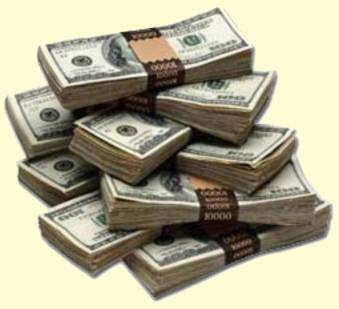Money:
http://en.wikipedia.org/wiki/Money
"Money is any token or other object that functions as a medium of exchange that is socially and legally accepted in payment for goods and services and in settlement of debts. Money also serves as a standard of value for measuring the relative worth of different goods and services and as a store of value. Some authors explicitly require money to be a standard of deferred payment.[1]Money includes both currency, particularly the many circulating currencies with legal tender status, and various forms of financial deposit accounts, such as demand deposits, savings accounts, and certificates of deposit. In modern economies, currency is the smallest component of the money supply.Money is not the same as real value, the latter being the basic element in economics. Money is central to the study of economics and forms its most cogent link to finance. The absence of money causes an economy to be inefficient because it requires a coincidence of wants between traders, and an agreement that these needs are of equal value, before a barter exchange can occur. The efficiency gains through the use of money are thought to encourage trade and the division of labour, in turn increasing productivity and wealth.Money is generally considered to have the following characteristics, which are summed up in a rhyme found in older economics textbooks and a primer: "Money is a matter of functions four, a medium, a measure, a standard, a store."There have been many historical arguments regarding the combination of money's functions, some arguing that they need more separation and that a single unit is insufficient to deal with them all. 'Financial capital' is a more general and inclusive term for all liquid instruments, whether or not they are a uniformly recognized tender." "Commodity money is any money that is both used as a general purpose medium of exchange and as a tradable commodity in its own right.[2]Commodity based currencies are often viewed as more stable, but this is not always the case. The value of a commodity based currency as a medium of exchange depends on its supply relative to other goods and services available in the economy. Historically, gold, silver and other metals commonly used in commodity based monetary systems have been subject to regular and sometimes extraordinary fluctuations in purchasing power. This not only damages its stability as a medium of exchange; it also reduces its effectiveness as a store of value. In the 1500s and 1600s huge quantities of gold and even larger amounts of silver were discovered in the New World and brought back to Europe for conversion into coin. As a result, the purchasing power of those coins fell by 60% to 80%, i.e. the prices of goods rose, because the supply of goods did not keep pace with the increased supply of money.[3] In addition, the relative value of silver to gold shifted dramatically downward.[4] Such discoveries of huge sources of gold or silver are a thing of the past, and lend to their supply stability. More recently, from 1980 to 2001, gold was a particularly poor store of value, as gold prices dropped from a high of $850/oz. ($27.30 /g) to a low of $255/oz. ($8.20 /g).[citation needed] It should be noted that gold was not a currency at this time, and was fluctuating due to its status as a final store of value — that is, the price never goes to zero as fiat currencies inevitably do.[citation needed] The advantage of gold and silver, however, lies in the fact that, unlike fiat paper currency, the supply cannot be increased arbitrarily by a central bank." Within the first 6 replys, first to say I have no life and actually read this on a friday night gets six dollars and sixty six cents on stars. You're welcome. "It is also possible for the trading value of a commodity money to be greater than its value as a medium of exchange when governments attempt to fix exchange rates between different commodity monies. When this happens people will often start melting down coins and reselling the metal used to make them. This has happened periodically in the United States, eventually causing it to move away from pure silver nickels and pure copper pennies.[citation needed] Shipping coins from one jurisdiction to another so that they could be reminted was sometimes a lucrative trade before the advent of trusted paper money. [citation needed]Commodity money's ability to function as a store of value is also limited by its very nature. Copper and tin risk rust and corrosion. Gold and silver are soft metals that can lose weight through scratches and abrasions, but this is nothing by comparison to fiat currencies, where billions of dollars can be injected ("printed") into the market within moments.Stability aside, commodity-based currencies may have a tendency to restrain growth in a very active economy. For example, in order to maintain the price level, the supply of money in an any economy must be equal or greater than the volume of goods and services produced. If commodities are used as money, then the total production can easily outstrip the supply of those commodities, which leads to price deflation. The lower prices of goods would signal to their producers to reduce the supply of goods, hence restoring the price level. As such, production within commodity-based economies tends to be limited by the supply of the commodity currency.[citation needed].This problem is compounded by the fact that money also serves as a store of value. This encourages hoarding (in other circumstances known as "saving")and takes the commodity money out circulation, reducing the supply. The supply of circulating commodity currency is further reduced by the fact that commodity moneys also have competing non-monetary uses. For example, gold and silver are used in jewelry, and nickel and copper have important industrial uses. Commodity based currencies also limit the geographic extent of the trading market. To make large purchases either a large volume or a high weight or both of the commodity must be transported to the seller. The cost of transportation of the currency raises the transaction cost and makes long distance sales less attractive."
Good read huh?
Free monies:

and bonus pic:

tl;dr: money is good



